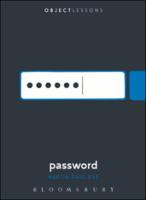Password
Abstract
This book is available as open access through the Bloomsbury Open Access programme and is available on www.bloomsburycollections.com. The open-access edition of this text was made possible by a Philip Leverhulme Prize from The Leverhulme Trust. Object Lessons is a series of short, beautifully designed books about the hidden lives of ordinary things. Where does a password end and an identity begin? A person might be more than his chosen ten-character combination, but does a bank know that? Or an email provider? What’s an ‘identity theft’ in the digital age if not the unauthorized use of a password? In untangling the histories, cultural contexts and philosophies of the password, Martin Paul Eve explores how ‘what we know’ became ‘who we are’, revealing how the modern notion of identity has been shaped by the password. Ranging from ancient Rome and the ‘watchwords’ of military encampments, through the three-factor authentication systems of Harry Potter and up to the biometric scanner in the iPhone, Password makes a timely and important contribution to our understanding of the words, phrases and special characters that determine our belonging and, often, our being. Object Lessons is published in partnership with an essay series in The Atlantic.
Keywords
Literary theory; Philosophy: aesthetics; Media studiesDOI
10.5040/9781501314902ISBN
9781501314889, 9781501314896, 9781501314889Publisher
Bloomsbury AcademicPublisher website
https://www.bloomsbury.com/academic/Publication date and place
New York, 2016Imprint
Bloomsbury AcademicSeries
Object Lessons,Classification
Literary theory
Philosophy: aesthetics
Media studies


 Download
Download